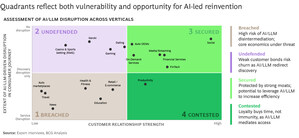
BOSTON, Dec. 11, 2019 /PRNewswire/ -- Four years after the historic meeting that produced the Paris Climate Accord, climate action is nowhere near the scale that is needed. Greenhouse gas emissions are well above the levels that would limit global warming, and government commitments and policies are dramatically insufficient.
The World Economic Forum (WEF), in collaboration with Boston Consulting Group (BCG), released a new report today on the progress made so far. The report is the first of a two-part study titled The Net Zero Challenge.
Government Commitments and Policies are Dramatically Insufficient
Only 67 of the UN's 195 member nations—accounting for less than 15% of emissions—have a net zero emissions ambition in place. Of these countries, only 16 have developed roadmaps and intermediate targets, and even fewer—seven—have instituted policy frameworks that could realistically support reaching the net zero emissions goal.
Despite some positive examples of selected countries and local governments upgrading their ambition and policies, much more progress is needed in the run up to Glasgow 2020 (COP26).
Only a Minority of Corporations Taking the Lead
The BCG/WEF report finds that a subset of companies across multiple sectors have come up with ambitious plans to decarbonize their operations and supply chains, recognizing that there is a business case for doing so.
However, of the 7,000 corporations worldwide that actually report to CDP , the non-profit organization that monitors global emissions, only one in eight disclose their emissions fully, have a target, and are actually reducing their emissions year-on-year. Moreover, the majority of targets are short-term oriented and not ambitious enough, and the lack of common reporting standards makes it difficult to establish benchmarks and track progress.
"In the current context, corporations have a major role to play to fight against climate change," said Michel Fredeau, BCG managing director and senior partner and head of the firm's Climate and Environment impact area. "Given the difficulties to reach a global consensus, corporations need to accelerate their action to transform their business models to become compatible with a 1.5° world, taking the lead to align their ecosystems and their investors."
Inadequate Pressure from Investors and Society
Investors, recognizing that global warming presents risks, have started to push for emissions disclosure and reduction in their portfolio companies. On a global scale, however, the impact of investor pressure is still not sufficient, and CEOs say the need to deliver short-term returns by far exceeds demands for long-term decarbonization strategies.
Pressure is also mounting from citizens and consumers, yet only 16% of adults globally consider climate change to be one of their top three societal concerns, according to a September 2019 survey from the market research firm Ipsos. While the trend is increasing, with a steady rise from 8% in 2016 and 11% in 2018, there are still many countries where climate change does not appear among the issues that worry people the most.
The Way Forward: Decisive Action by all Stakeholders
In the past decade, the world's carbon emissions have increased by 1.5% a year. To align to the 1.5° trajectory, emissions would have to decrease by 5% per year going forward. If there is no meaningful turnaround in emissions in the next five years, we will increasingly lose our ability to act. Yet it is still possible to prevent the worst effects of global warming if all stakeholders recognize the urgency as well as the benefits of taking action, according to the report.
"The technology solutions needed for decarbonization are largely available, abatement costs are falling, and barriers to action are often overstated," said Patrick Herhold, BCG managing director and partner and co-lead of the firm's Center for Climate Action. "In many cases, governments and businesses have economic reasons for individual action now."
A copy of the report can be downloaded here.
BCG's Center for Climate Action partners with businesses and governments to help them prepare for a decarbonized world, supporting them as they drive technological and economic transformations and realize competitive advantage in a low-carbon economy.
To arrange an interview with one of the authors, please contact Eric Gregoire
at +1 617 850 3783 or [email protected].
About Boston Consulting Group
Boston Consulting Group partners with leaders in business and society to tackle their most important challenges and capture their greatest opportunities. BCG was the pioneer in business strategy when it was founded in 1963. Today, we help clients with total transformation—inspiring complex change, enabling organizations to grow, building competitive advantage, and driving bottom-line impact.
To succeed, organizations must blend digital and human capabilities. Our diverse, global teams bring deep industry and functional expertise and a range of perspectives to spark change. BCG delivers solutions through leading-edge management consulting, along with technology and design, corporate and digital ventures,and business purpose. We work in a uniquely collaborative model across the firm and throughout all levels of the client organization, generating results that allow our clients to thrive.
1Carbon Disclosure Project
SOURCE Boston Consulting Group (BCG)








Share this article